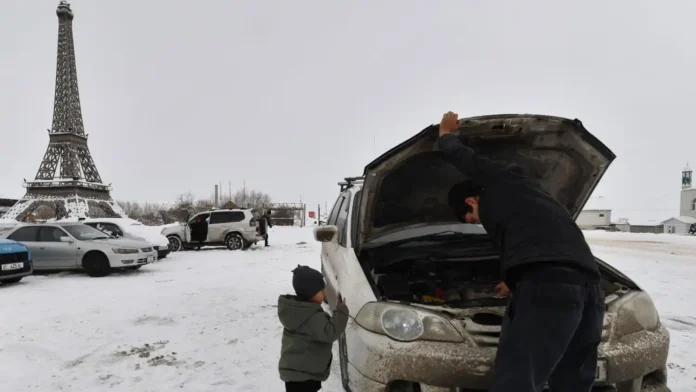Bishkek-Osh Highway, Kyrgyzstan – In the heart of Kyrgyzstan’s mountainous terrain, a tiny settlement unofficially known as “Paris” has become a crucial stopover for weary truckers braving one of Central Asia’s most treacherous roads.
Located at the 152-kilometre mark of the Bishkek-Osh highway, this remote hamlet is home to around 100 people and even boasts its own 15-metre replica of the Eiffel Tower.
Truck driver Nurzhigit Abrahman, 22, found himself stranded in the settlement on January 22 as snowstorms closed the road.
“I stopped in Paris because the roads are closed, there’s too much snow. While they grit the roads, I’m going to eat and rest,” he told AFP.
The village’s small repair shop also provided an opportunity for Abrahman to change a tire before continuing his journey on the 700-kilometre route connecting Kyrgyzstan’s north and south.
The road through the Suusamyr Valley is notorious for its extreme weather. In 2023, temperatures in the area plummeted to a record-low of -47 degrees Celsius (-53 Fahrenheit).
Drivers must also contend with near-zero visibility, avalanches, and a high fatality rate on the winding mountain passes.
One of the most dangerous sections, Camel’s Pass, is littered with phone numbers for emergency breakdown services—though signals are often nonexistent.
Despite its harsh conditions, Paris has become a vital waystation, offering roadside cafés, a stable for livestock, and even a small infirmary.
“Before, there was nothing here, then containers appeared, and a village formed,” said Tamara Kachkynbayeva, a 55-year-old café owner who serves traditional meat dishes to truckers.
The name “Paris” was originally coined by passing truckers who were drawn to the settlement’s bright lights. Last summer, Kyrgyz businessman Nurzhan Kubatbekov decided to cement the village’s identity by financing a $14,000 replica of the Eiffel Tower.
Although 20 times smaller than its French counterpart, the illuminated structure has become a beacon in the snowy landscape. However, the settlement remains unrecognized by the Kyrgyz government. “No one has any documents for this land.
The village technically belongs to two different districts,” explained Urmat Nusubaliyev, who settled in Paris 27 years ago. “Either they legalise us or they raze it.” Locals are lobbying for official recognition, but government authorities have yet to respond to their appeals.
Adding to the uncertainty, officials plan to open an alternative Bishkek-Osh route later this year to accommodate growing cargo volumes.
While it promises to be a faster connection, the new road will bypass Paris entirely, raising concerns about the village’s survival. “The population is asking to legalise the situation and make the name Paris official,” Kachkynbayeva said.
Meanwhile, truckers like Eldiyar Dulatov, 26, continue to face unpredictable dangers on the road. Stranded in a snowstorm with a broken-down vehicle and no phone signal, he lamented, “I’ve got no signal and seven people in the car. A pipe has burst, and the fuel is leaking.”
For now, Kyrgyzstan’s Paris remains a crucial yet vulnerable stop on one of the world’s most perilous highways, its fate hanging in the balance between legal recognition and the looming possibility of obsolescence.
This article was created using automation technology and was thoroughly edited and fact-checked by one of our editorial staff members

